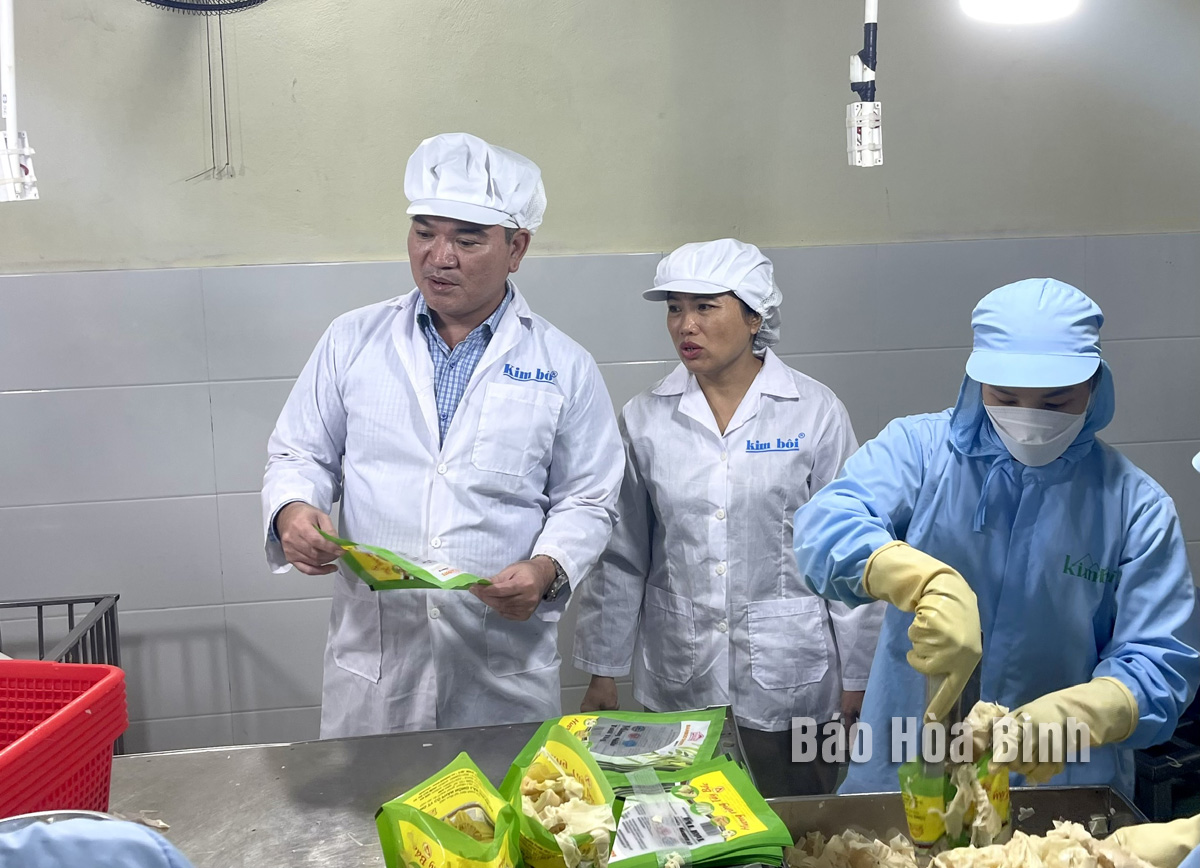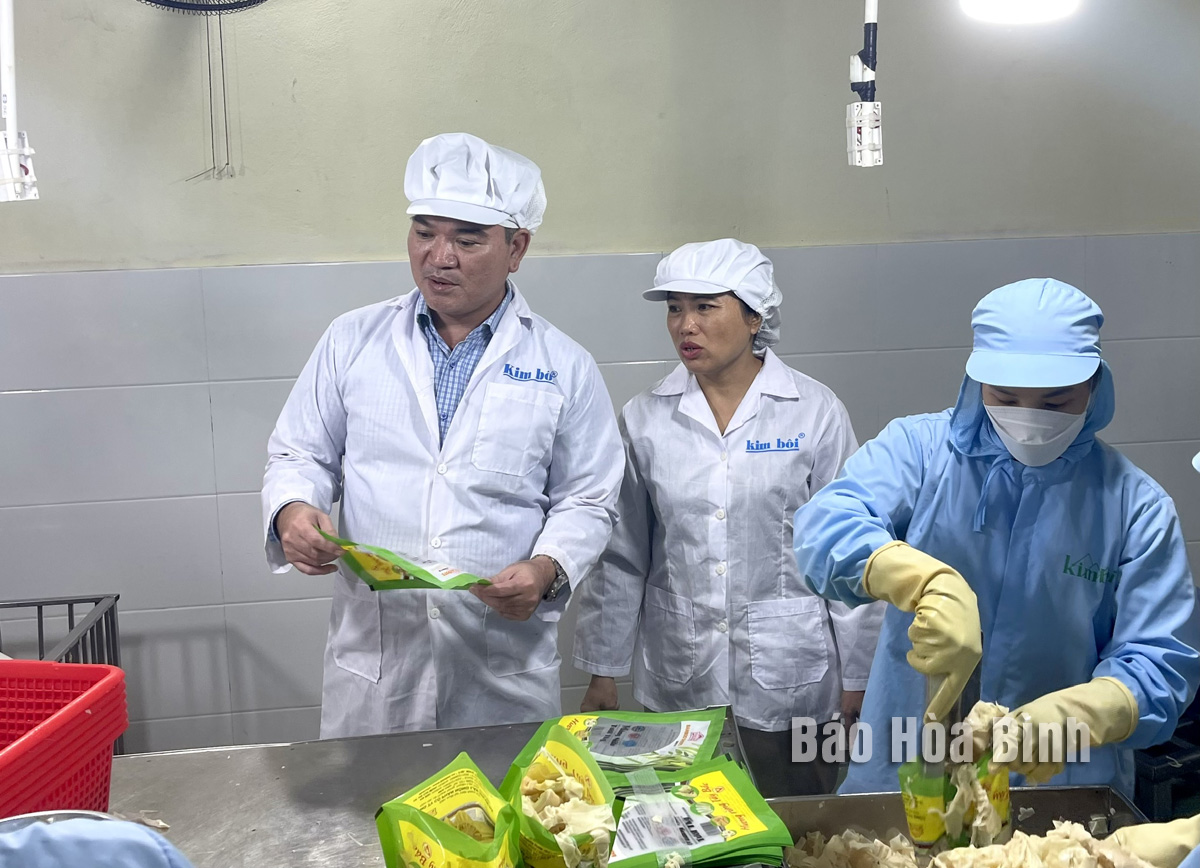
In order to evaluate and promote the export of the key agricultural products of the province through information and propaganda work on the mass media, on December 1, the provincial Department of Quality Management of Agricultural, Forestry and Fishery Products organized a working group to work with the production and business establishments with export products in 2023.
The representatives of the Provincial Department of Quality Management of Agricultural, Forestry and Fishery Products and Kim Boi joint Stock Company inspected the production and packaging process of bamboo shoot products.
This year, there are 14 enterprises, cooperatives, and cooperative groups that have had agricultural and forestry products exported to foreign markets with a total revenue of 978.45 billion VND. Regarding the quality certification and product brand development, during the year, 40 cultivation, livestock, and aquaculture facilities were supported and certified with VietGAP processes, GlobalGAP, organic, and ISO standards. The whole province issued 44 domestic and export growing area codes, bringing the total growing area codes to 59, with a total area of over 600 hectares with grapefruit, longan, banana, dragon fruit, watermelon, vegetables...
The representative of the Provincial Department of Quality Management of Agricultural, Forestry and Fishery Products awarded the GlobalGAP certificate to Dai Dong Agricultural Cooperative in Ngoc Luong commune (Yen Thuy).
The department of Quality Management of Agricultural, Forestry and Fishery Products worked with Dai Dong Agricultural Cooperative in Ngoc Luong commune (Yen Thuy) and Kim Boi joint Stock Company in Ba Hang Doi town (Lac Thuy). They evaluated and discussed the achieved results; the directions and plans for production and business in the coming years to improve the value of agricultural products, increase the people's income and the limitations and shortcomings that need to be overcome to maintain long-term agricultural export…
Also within the framework of the meeting, the Department of Quality Management of Agricultural, Forestry and Fishery Products awarded the GlobalGAP certificate to Dai Dong Agricultural Cooperative in Ngoc Luong commune (Yen Thuy); awarded ISO 22000-2018 certificate to Kim Boi joint Stock Company in Ba Hang Doi town (Lac Thuy).
The content and information collected at the meeting on the export of agricultural products will be the basis for the central and local news and press agencies to develop news, articles and reports for promotion on the mass media.
According to data from the Hoa Binh Provincial Party Committee, the industrial production index for the first six months of 2025 is estimated to have increased by 20% compared to the same period last year. This marks the highest year-on-year growth rate for this period since 2020.
In the first six months of 2025, Hoa Binh province’s export turnover was estimated at 1.145 billion USD, marking an 18.11% increase compared to the same period in 2024. Import turnover was estimated at $ 804 million, a 17.15% increase, which helped the province maintain a positive trade balance.
The lives of the ethnic minority farmers in Tan Lac district have gradually improved thanks to the new directions in agricultural production. This is a testament to the collective strength fostered through the professional associations and groups implemented by various levels of the district’s Farmers’ Union.
With the motto the "product quality comes first,” after nearly one year of establishment and operation, Muong village’s Clean Food Agricultural and Commercial Cooperative, located in Cau Hamlet, Hung Son Commune (Kim Boi district), has launched reputable, high-quality agricultural products to the market that are well-received by consumers. The products such as Muong village’s pork sausage, salt-cured chicken, and salt-cured pork hocks have gradually carved out a place in the market and they are on the path to obtaining the OCOP certification.
In the past, the phrase "bumper harvest, rock-bottom prices" was a familiar refrain for Vietnamese farmers engaged in fragmented, small-scale agriculture. But today, a new spirit is emerging across rural areas of Hoa Binh province - one of collaboration, organisation, and collective economic models that provide a stable foundation for production.
Maintaining growing area codes and packing facility codes in accordance with regulations is a mandatory requirement for agricultural products to be eligible for export. Recently, the Department of Agriculture and Environment of Hoa Binh province has intensified technical supervision of designated farming areas and packing facilities to safeguard the "green passport" that enables its products to access international markets.



